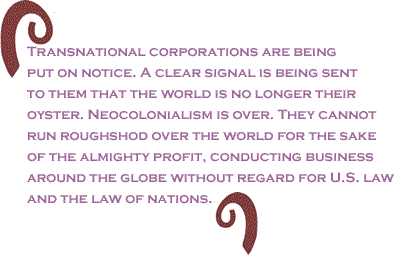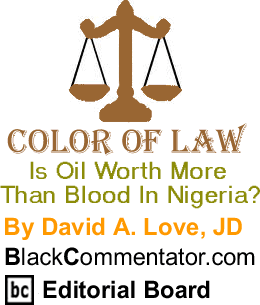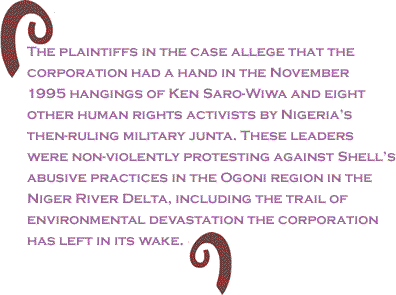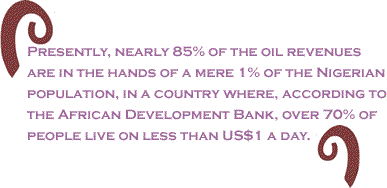
|
|||||||||||||||||||||||

Custom Search
|
|
 |
|
On May 26, 2009, a potentially historic human rights trial will take place in a federal court in New York. At issue: What did Royal Dutch/Shell, the multinational oil giant, do in Nigeria? The case is over a decade in the making. The suit, filed by the Center for Constitutional Rights (CCR) and EarthRights International, claims that Shell Oil and Brian Anderson—who was the managing director of Shell Nigeria—were complicit in the commission of human rights violations in that country. Specifically, the suit seeks to hold Shell accountable for summary executions, crimes against humanity, torture, inhuman treatment and the arbitrary arrest and detention of Nigerians. The plaintiffs in the case allege that the corporation had a hand in the November 1995 hangings of Ken Saro-Wiwa and eight other human rights activists by Nigeria’s then-ruling military junta. These leaders were non-violently protesting against Shell’s abusive practices in the Ogoni region in the Niger River Delta, including the trail of environmental devastation the corporation has left in its wake. They are known collectively as the Ogoni Nine. Saro-Wiwa, who with the other activists was convicted and hanged on trumped-up murder charges, demanded a cleanup of Shell’s hundreds of oil spills throughout the region. In addition, and perhaps more poignantly—because wherever there is oil there are monied interests to protect and poor people to potentially exploit—they were pushing for a greater share of oil revenues to the Ogoni people. Presently, nearly 85% of the oil revenues are in the hands of a mere 1% of the Nigerian population, in a country where, according to the African Development Bank, over 70% of people live on less than US$1 a day. Environmental devastation The once-fertile Niger Delta region was known as the breadbasket of Nigeria. According to an independent team of Nigerian, American and British scientists, the region is “one of the world’s most severely impacted ecosystems,” and “one of the 10 most important wetlands and marine ecosystems in the world. Millions of people depend on the Delta’s natural resources for survival, including the poor in many other West African countries who rely on the migratory fish from the Delta.” For the people in the region, who rely on subsistence farming and fishing, Shell’s drilling, deforestation and other activities have created poverty. Further, the World Bank says that gas-flaring in
Nigeria—the process by which an oil company burns off the excess
natural gas caused by oil drilling—has created more greenhouse gas
emissions than in the rest of sub-Saharan Africa combined. And
an estimated 1.5 million tons of oil Shell and the military Forty percent of Nigeria’s oil goes to the U.S., and Shell is a major player in Nigeria. For the more than 50 years Shell has engaged in oil production in Nigeria, human rights groups note, the corporation has worked closely with the Nigerian government to suppress local opposition to its presence there. In the early 1990s, when Saro-Wiwa’s human rights group MOSOP (The Movement for the Survival of the Ogoni People) was formed, Shell asked for armed assistance against local protestors, and armed and financed Nigerian soldiers. There was a reign of terror, in which the Nigerian military, with help from Shell according to human rights groups, falsely arrested, beat, raped and tortured people. After Shell requested military backup to build an oil pipeline in Ogoni, one woman who protested the bulldozing of her crops was shot by Nigerian soldiers and lost her arm.
In 1994, the military blocked Saro-Wiwa and other Ogoni leaders from attending a gathering. Four Ogoni chiefs were subsequently killed at the gathering, and the military blamed Saro-Wiwa and MOSOP for the killings. The Ogoni Nine were arrested, and, the military raided 60 Ogoni towns, beating and arresting hundreds of suspected MOSOP members. As one Nigerian military official wrote in a memorandum: “Shell operations still impossible unless ruthless military operations are undertaken for smooth economic activities to commence.” The Ogoni Nine bore the full brunt of that ruthlessness— with a sham, kangaroo trial, presided over by a shady, ruthless military regime, and with Shell attempting to bribe two men to testify against Saro-Wiwa, as the plaintiffs allege. Saro-Wiwa said the following in his closing statement at trial:
Ken Saro-Wiwa, Jr. speaks out Nearly 14 years after his father’s hanging execution, Ken Saro-Wiwa, Jr., a plaintiff in the lawsuit, recently reflected on his father’s death and the struggle for justice in Nigeria:
Mr. Saro-Wiwa, Jr. noted that Nigeria is an oil rich country whose people feel they are not benefitting from all of these rich resources, that everything the government does is for the benefit of transnational corporations and in the interests of Big Oil. As a result, people on the ground are protesting these conditions:
Shell responds to the allegations It is true that Nigerian Gen. Sani Abacha, the brutal and corrupt military dictator at the time, died in 1998. But the people of Nigeria’s Ogoni region still suffer. And observers would suggest that Shell, still an oil powerhouse in that country, cannot shake off the executions of the Ogoni Nine, despite all of the best greenwashing and public relations strategies that money can buy. In response to the suit filed against the corporation, Shell spokesman Stan Mays provided me with the following written statement:
Corporations on notice So, the question that arises is, why bring the current lawsuit in a U.S. court? Well, although the alleged crimes did not take place on U.S. soil, Shell does substantial business in the U.S. Moreover, the plaintiffs filed the case under the Alien Tort Statute, a 1789 law which allows lawsuits in U.S. courts for international violations of human rights. In addition, the Torture Victim Prevention Act allows a plaintiff to seek damages for extrajudicial killing or torture, regardless of where it occurs in the world. The suit was also brought under the laws of New York, and international laws. “The case is significant because people doing business in the U.S. have to follow U.S. law, which includes human rights violations,” says Jennie Green of the Center for Constitutional Rights (CCR), attorney for the plaintiffs. “These are universally recognized laws. This is more than a mere tort, it is something that is universally recognized. Shell should have known better.”
In what appears to be a “shell game,” Green noted that Shell has spent years dragging its feet; fighting the case on the grounds that it did not belong in the U.S.; attempting, without success, to petition the Supreme Court, and claiming that the Netherlands-based parent company Royal Dutch/Shell had nothing to do with the case, but rather that Shell Nigeria was the proper defendant. During these troubled times in America— when the nation’s underbelly is exposed for all the world to see—matters of corporate corruption and malfeasance, and environmental devastation are on the minds of many. If the plaintiffs in Wiwa v. Shell are victorious, this would be the first time that a multinational corporation is held liable in a U.S. court for human rights violations overseas. CCR’s Green believes that these days, a U.S. jury is more likely to believe that a corporation and its officers are capable of such corruption that they would harm individuals in this manner. “Here in the U.S. the message has been brought home,” said Ken Saro-Wiwa, Jr. “Corporations have to be held accountable, and it is difficult for sovereign nations to hold them accountable because of the fluidity of capital. There is a gap between global capital and systems of law.” And this is a time when transnational corporations are being put on notice. A clear signal is being sent to them that the world is no longer their oyster. Neocolonialism is over. They cannot run roughshod over the world for the sake of the almighty profit, conducting business around the globe without regard for U.S. law and the law of nations. The U.S. Securities and Exchange Commission is presently investigating Shell for engaging in graft in Nigeria, a violation the U.S. Foreign Corrupt Practices Act. In February, the Halliburton spinoff KBR admitted to paying bribes to secure contracts related to the construction of a liquefied natural gas facility in Nigeria. Halliburton and KBR agreed to pay fines of over $579 million, the largest fine ever in a U.S. corruption case. And the notorious U.S. military contractor Blackwater (now called Xe), has been sued in the U.S., and some of its employee-mercenaries federally indicted for firing upon and killing unarmed civilians in Baghdad in 2007. And a federal judge in New York has paved the way for South African plaintiffs to pursue lawsuits against GM, Ford, Daimler, and IBM “for aiding and abetting torture ... extrajudicial killing, and apartheid.” When I asked him about his thoughts regarding Shell, the struggles of the Niger Delta and the upcoming trial, Ken Saro-Wiwa, Jr. said that “When you look at what is happening in the world, there is no justice.” At the same time, he emphasized that “Gandhi said that good always triumphs over evil in the end.” Indeed, these words will be put to the test again very soon. BlackCommentator.com Editorial Board member David A. Love, JD is a journalist and human rights advocate based in Philadelphia, and a contributor to the Progressive Media Project, McClatchy-Tribune News Service, In These Times and Philadelphia Independent Media Center. He contributed to the book, States of Confinement: Policing, Detention, and Prisons (St. Martin's Press, 2000). Love is a former Amnesty International UK spokesperson, organized the first national police brutality conference as a staff member with the Center for Constitutional Rights, and served as a law clerk to two Black federal judges. He blogs at davidalove.com, Daily Kos, and Open Salon. Click here to contact Mr. Love. |
|
Any BlackCommentator.com article may be re-printed so long as it is re-printed in its entirety and full credit given to the author and www.BlackCommentator.com. If the re-print is on the Internet we additionally request a link back to the original piece on our Website. Your comments are always welcome. eMail re-print notice
If you send us an eMail message we may publish all or part of it, unless you tell us it is not for publication. You may also request that we withhold your name. Thank you very much for your readership. |
|
| |
|
| April 30 , 2009 Issue 322 |
|
| Executive Editor: Bill Fletcher, Jr. |
| Managing Editor: Nancy Littlefield |
| Publisher: Peter Gamble |
| Est. April 5, 2002 |
Printer Friendly Version
in resizeable plain
text format or pdf
format. |
| Frequently Asked Questions |
 |

|
 |
 |
 |
| |
| |







































